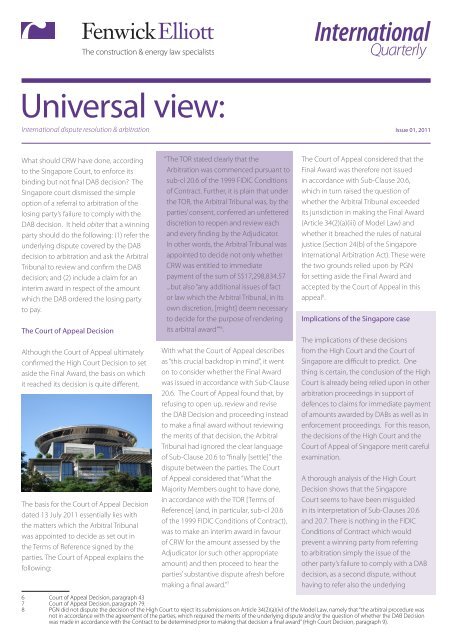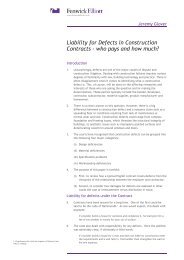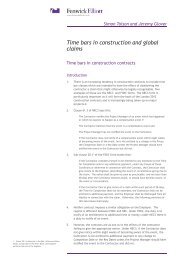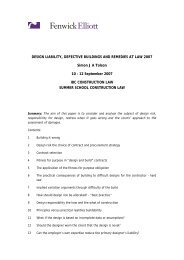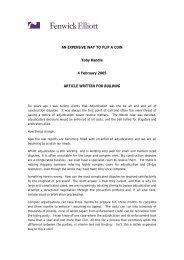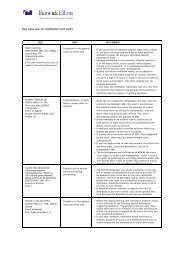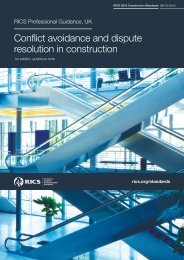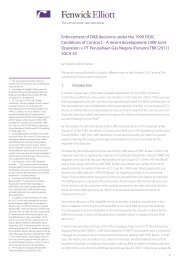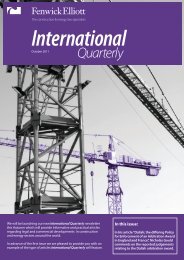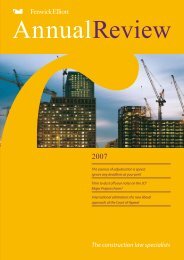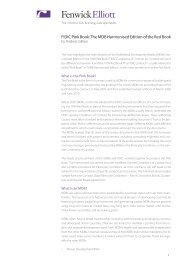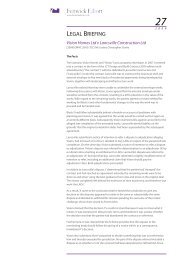download PDF - Fenwick Elliott
download PDF - Fenwick Elliott
download PDF - Fenwick Elliott
- No tags were found...
You also want an ePaper? Increase the reach of your titles
YUMPU automatically turns print PDFs into web optimized ePapers that Google loves.
Universal view:International dispute resolution & arbitration Issue 01, 2011What should CRW have done, accordingto the Singapore Court, to enforce itsbinding but not final DAB decision? TheSingapore court dismissed the simpleoption of a referral to arbitration of thelosing party’s failure to comply with theDAB decision. It held obiter that a winningparty should do the following: (1) refer theunderlying dispute covered by the DABdecision to arbitration and ask the ArbitralTribunal to review and confirm the DABdecision; and (2) include a claim for aninterim award in respect of the amountwhich the DAB ordered the losing partyto pay.The Court of Appeal DecisionAlthough the Court of Appeal ultimatelyconfirmed the High Court Decision to setaside the Final Award, the basis on whichit reached its decision is quite different.The basis for the Court of Appeal Decisiondated 13 July 2011 essentially lies withthe matters which the Arbitral Tribunalwas appointed to decide as set out inthe Terms of Reference signed by theparties. The Court of Appeal explains thefollowing:“The TOR stated clearly that theArbitration was commenced pursuant tosub-cl 20.6 of the 1999 FIDIC Conditionsof Contract. Further, it is plain that underthe TOR, the Arbitral Tribunal was, by theparties’ consent, conferred an unfettereddiscretion to reopen and review eachand every finding by the Adjudicator.In other words, the Arbitral Tribunal wasappointed to decide not only whetherCRW was entitled to immediatepayment of the sum of S$17,298,834.57...but also “any additional issues of factor law which the Arbitral Tribunal, in itsown discretion, [might] deem necessaryto decide for the purpose of renderingits arbitral award”” 6 .With what the Court of Appeal describesas “this crucial backdrop in mind”, it wenton to consider whether the Final Awardwas issued in accordance with Sub-Clause20.6. The Court of Appeal found that, byrefusing to open up, review and revisethe DAB Decision and proceeding insteadto make a final award without reviewingthe merits of that decision, the ArbitralTribunal had ignored the clear languageof Sub-Clause 20.6 to “finally [settle]” thedispute between the parties. The Courtof Appeal considered that “What theMajority Members ought to have done,in accordance with the TOR [Terms ofReference] (and, in particular, sub-cl 20.6of the 1999 FIDIC Conditions of Contract),was to make an interim award in favourof CRW for the amount assessed by theAdjudicator (or such other appropriateamount) and then proceed to hear theparties’ substantive dispute afresh beforemaking a final award.” 7The Court of Appeal considered that theFinal Award was therefore not issuedin accordance with Sub-Clause 20.6,which in turn raised the question ofwhether the Arbitral Tribunal exceededits jurisdiction in making the Final Award(Article 34(2)(a)(iii) of Model Law) andwhether it breached the rules of naturaljustice (Section 24(b) of the SingaporeInternational Arbitration Act). These werethe two grounds relied upon by PGNfor setting aside the Final Award andaccepted by the Court of Appeal in thisappeal 8 .Implications of the Singapore caseThe implications of these decisionsfrom the High Court and the Court ofSingapore are difficult to predict. Onething is certain, the conclusion of the HighCourt is already being relied upon in otherarbitration proceedings in support ofdefences to claims for immediate paymentof amounts awarded by DABs as well as inenforcement proceedings. For this reason,the decisions of the High Court and theCourt of Appeal of Singapore merit carefulexamination.A thorough analysis of the High CourtDecision shows that the SingaporeCourt seems to have been misguidedin its interpretation of Sub-Clauses 20.6and 20.7. There is nothing in the FIDICConditions of Contract which wouldprevent a winning party from referringto arbitration simply the issue of theother party’s failure to comply with a DABdecision, as a second dispute, withouthaving to refer also the underlying6 Court of Appeal Decision, paragraph 437 Court of Appeal Decision, paragraph 79.8 PGN did not dispute the decision of the High Court to reject its submissions on Article 34(2)(a)(iv) of the Model Law, namely that “the arbitral procedure wasnot in accordance with the agreement of the parties, which required the merits of the underlying dispute and/or the question of whether the DAB Decisionwas made in accordance with the Contract to be determined prior to making that decision a final award” (High Court Decision, paragraph 9).


